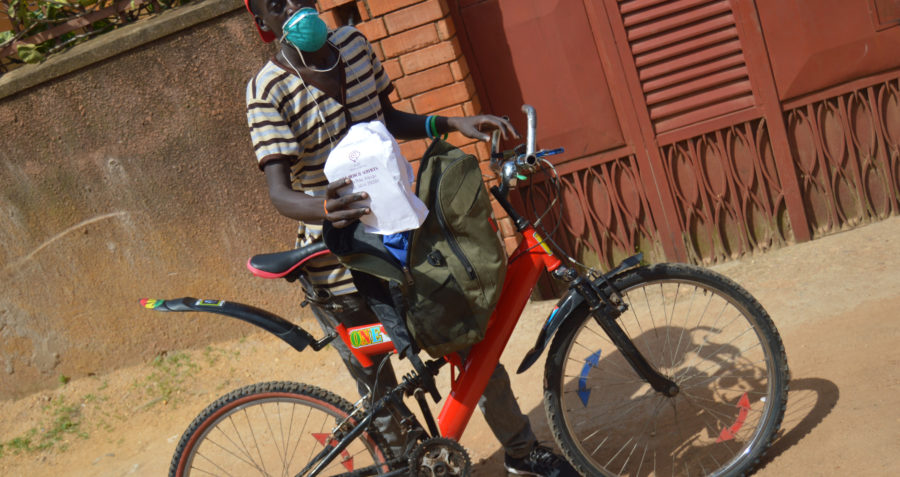Lockdown hero: one young man, his bike and a big heart
 © AMS/Frontline AIDS
© AMS/Frontline AIDS
Since the start of the COVID-19 crisis, young Ugandan Faisal has shown guts and determination to continue reaching 20 young people he usually counsels about HIV.
Faisal, 22 and living in Kampala, was born with HIV and now as a peer educator spends much of his time supporting others his age to come to terms with their HIV status and to keep healthy.
This is his account of life under lockdown.
Faisal’s story
I’m working with Alive Medical Services [AMS] as a peer educator. I started two years ago, working with young people living with HIV.
When I heard about the lockdown, first of all it came to my mind to think about people in the area, and I thought about my fellow youth. I’m in touch with them on social media – on Facebook, Whatsapp and Twitter. Some of them are fine, some of them are not fine. Some of them have transport challenges to get their medicine, some live far away and cannot get treatment.
When lockdown came they stopped all public transport so I sat down to figure out what you have to do as a peer educator. I sat down with my fellow workers and with our good Dr Pasquine, and I told them what I was planning to do because the boda bodas [motorbike taxis] were not allowed and not all young people can afford Uber. So I said the bicycle can work. I can use a bicycle and deliver medicine to people safely.
How I am helping in lockdown
I have a target so if you connect with me on Saturday, I make sure I will get your ART [antiretroviral therapy] on Monday morning. Then I work out the time to spend on that journey to pick up the medicine and take it to them before curfew.
Right now I have a responsibility to go to the community, I cannot say no to delivering medicines. Whatever I have to do, I have to help them. Sometimes I go as far as Mukono [15 miles away] and come back on the same day. I use a lot of energy and when I reach home I just feel like I want to sleep, the bones are weak. I’m so tired but I’m ready to help my fellow youth who are living with HIV.
Another challenge is I get stopped a lot and have to explain about AMS and what I’m doing. I just explain I’m taking ART. I always use a mask and sanitiser when I go to the community. I keep a distance when delivering.
The good news is that right now my fellow youth are taking their medicine. Some of them thought that when lockdown came we wouldn’t consider them, but we came to help and they are so happy.
Living with HIV is not the end
I like to be a peer educator because of the counselling and guidance. Sometimes I counsel my fellow peers about taking their medicine. I tell them you don’t have to be having a high viral load.
When I first found out I had HIV, I felt so bad and ran away from home. I left my family, I went to my uncle’s place, I didn’t tell him about my status. I just stayed there until I’d sorted things out with my mum.
A time came when I understood my situation and realised that this is not the end because living with HIV does not mean you are not a human being. That’s why I tell people sometimes – we are the same blood even if I have HIV, and whatever you can do I can do it even if I have HIV. That’s why right now I’m confident with my status.
Alive Medical Services is a key implementing partner of Frontline AIDS’ SRHR Umbrella Grant and runs peer-led outreach programmes where youth peer educators support young clients in their home communities. They are uniquely positioned to encourage behaviour change, combat stigma, and help those who are having difficulty working towards disclosure of their HIV status.
Tags
COVID-19HIV treatmentPeer supportSexual and reproductive health and rights (SRHR)SRHR Umbrella GrantUganda


